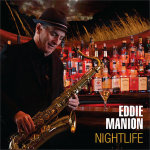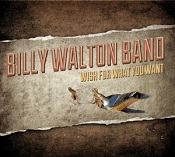 OK, so just to save a bit of time, we all know about Eddie Manion, yeah? Whaddya mean, no? Where have you been for the last forty years? You really should get out more. If you want the whole nine yards, check out his Wikipedia entry, but, just for the moment, his first major gig was with Southside Johnny and the Asbury Jukes, and since then he’s played with Dion, Dave Edmunds, Diana Ross, The Allman Brothers, Willy De Ville, Keith Richards and Bob Dylan and many, many more. He was part of the E Street Band for Bruce Springsteen’s “Wrecking Ball” tour and, more recently, he’s been touring Europe with the Light of Day Foundation raising money for Parkinson’s Disease research. His motto is ‘Have Sax, Will Travel’.
OK, so just to save a bit of time, we all know about Eddie Manion, yeah? Whaddya mean, no? Where have you been for the last forty years? You really should get out more. If you want the whole nine yards, check out his Wikipedia entry, but, just for the moment, his first major gig was with Southside Johnny and the Asbury Jukes, and since then he’s played with Dion, Dave Edmunds, Diana Ross, The Allman Brothers, Willy De Ville, Keith Richards and Bob Dylan and many, many more. He was part of the E Street Band for Bruce Springsteen’s “Wrecking Ball” tour and, more recently, he’s been touring Europe with the Light of Day Foundation raising money for Parkinson’s Disease research. His motto is ‘Have Sax, Will Travel’.
Eddie Manion plays tenor and baritone sax (mainly baritone when working as part of a horn section) as well as having a pretty good voice, which you can hear on his first solo album, “Follow Through”, released in 2004. At the end of the gargantuan “Wrecking Ball” tour, Eddie started work on his second solo album “Nightlife”, opting this time for instrumental interpretations of standards and not-quite-so-standards, rather than his own compositions. It’s a double-edged sword. Both ways you’re going to be judged; one way you’re compared with others’ songwriting, the other way you’re compared with previous versions of the same songs. So how does “Nightlife” shape up?
I guess it’s natural for anyone who’s spent their entire adult life as a professional musician to want to do their own thing once in a while. Eddie Manion’s spent a lot of time playing in horn sections in big bands where nuance isn’t always too high on the agenda, so when the window of opportunity opened, he pulled together a superb bunch of musicians to make an album placing his sax playing firmly stage centre against a backdrop that allows him to interpret songs with style and subtlety. From the album’s opener, a gorgeous version of the theme from the 1961 movie “Town Without Pity”, with its piano triplets and wah-wah trumpet, to the closer “”The Only One, from Roy Orbison’s final album, the album demonstrates Eddie’s ability to create flawless interpretations of jazz standards such as “Smoke Gets in Your Eyes” and “Stardust” whilst also combining Springsteen’s “City of Night” in a medley with King Curtis’s “Soul Serenade”.
Throughout “Nightlife”, Eddie Manion combines a jazz-styled finesse with a rawer rock edge to create a satisfying and varied set of instrumentals that embody great musicianship and sympathetic arrangements. If you value musical skill and the ability to pick a good tune, then you’ll love this; Eddie’s a superb player and he’s surrounded himself with like minds to produce a real musician’s album. As an added bonus, Eddie’s also a very good photographer and the CD packaging includes some of his own fabulous photos taken mainly on the “Wrecking Ball” tour; it’s the icing on the cake of a lovely album.
You can order it here.
 So what’s been happening to the Billy Walton Band since the release of “Crank it Up” in 2012? Well, apart from the non-stop touring in the USA, Europe and the UK, the band has had a few line-up changes. Tenor sax player Rich Taskowitz has moved on and Billy has brought in Ian Gray (trombone) and Sean Marks (tenor and baritone sax) to fill out the band’s sound, moving away from a jazz set-up with two soloists to more conventional rock and soul lineup with frontman and backing horn section. It’s a slight change of emphasis, but it creates a more cohesive full-band sound underpinned by the rock-solid rhythm section of John D’Angelo (drums) and William Paris (bass).
So what’s been happening to the Billy Walton Band since the release of “Crank it Up” in 2012? Well, apart from the non-stop touring in the USA, Europe and the UK, the band has had a few line-up changes. Tenor sax player Rich Taskowitz has moved on and Billy has brought in Ian Gray (trombone) and Sean Marks (tenor and baritone sax) to fill out the band’s sound, moving away from a jazz set-up with two soloists to more conventional rock and soul lineup with frontman and backing horn section. It’s a slight change of emphasis, but it creates a more cohesive full-band sound underpinned by the rock-solid rhythm section of John D’Angelo (drums) and William Paris (bass).
For their fourth studio album, “Wish for What You Want” (released in the USA on Vizztone on January 27), the band has enlisted the services of respected producer Tony Braunagel and keyboard player Mike Finnigan, plus a few special guests from New Jersey and the tweaks seem to have paid off. As you might expect from the Billy Walton Band, the album works across many styles and genres, featuring strong songs and the usual high quality arrangements and playing; oh, and a bit of fun as well.
The album opens in a blast of horns and guitar with the uplifting rock and soul of “Wish for What You Want” and the first of many proper endings – none of your lazy fade-outs here and a standout track. “True Lovin’ Man” has a mid-tempo 70s feel, particularly in the horn arrangements before the blues stomper “Mountain” bursts in with a huge guitar riff. “Come on Up” is an organ-driven straight-ahead rocker, building up a head of steam before changing down a few gears for the country blues of “Blues Comes A Knockin’” featuring Southside Johnny on harmonica. “Forgive and Forget” takes the tempo straight back up again with the full band with organ and horns laying the foundation for Billy’s wah-wah guitar fills and solo. If the album gets a vinyl release, this is the perfect way to end Side One.
“Change” is exactly that, a brooding, atmospheric piece which channels Sergio Leone through Ray Manzarek before breaking into the straightforward blues chugger, “Worried Blues”. The next three tracks are probably the most commercial songs on the album; “Till Tomorrow” is a reworking of a “Crank It Up” song which adds a piano intro and plays down the horn fills. It’s a great song with a perfect guitar hook and in earlier times it would have been a perfect choice for a single. “Walk that Little Girl Home” is a Willy de Ville cover which mixes early Springsteen with The Drifters to evoke the Jersey shore perfectly and create another of the album’s highlights. “It Don’t Matter” has an E Street Band–inspired intro leading in to a “Take Your Job and Shove It” lyric which might or might not be autobiographical; it also features a great sax solo from Joey Stann; another former Asbury Juke. The album’s final track, “Hudson County Star” is loose blues/rock workout poking fun at corruption in the New Jersey political scene (a wide target, to be fair) which gives William Paris his customary shot at a lead vocal.
“Wish for What You Want” is another step forward for the Billy Walton Band. The band has evolved from the original power trio line-up focussing mainly on Billy’s guitar work to a rock and soul five-piece capable of covering a wide variety of styles. If you like your songs served up with big guitars and horns, then this one’s for you. If you decide that you like the album, then I’ve got a piece of advice for you; go out and watch the band live. You won’t regret it.
Released January 27 2015 on Vizztone.


